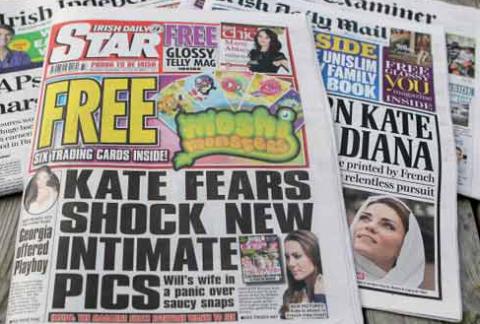Claims that privacy legislation would curtail investigative journalism are laughable

Arguably, it is in its role in the continuing subjugation of women that the media is at its most insidious. By Vincent Browne.
There is more to the publication of the topless photographs of Kate Middleton than the breach of her privacy or the hilarity of a long-time dedicated porn pusher, Richard Desmond, finding a principle here, or Independent News and Media (INM), publisher of the Sunday Independent and the Sunday World, suspending an editor on ethical grounds.
Of course there was no justification for the publication of photographs of Kate Middleton on an occasion when she had reasonable expectation of privacy and where there was no overriding public interest consideration, as distinct from a public prurience consideration, as Alan Shatter has observed.
The photographs were published to boost corporate profits and the standing of the executives involved in INM’s currently precarious hierarchy.
The reason there is a hullabaloo now over the Kate Middleton pictures is solely because Richard Desmond, publisher of the British version of the Star, has thrown a wobbly, lest his evolving cosy relationship with the British royal family be disturbed by this infraction – and that wobbly threatens the continuance of a significant money-earner for INM.
On the demise of the News of the World last year, that newspaper published a valedictory issue in which it highlighted its major “scoops” over the years. Among them were: “Andrew and the playgirl”, “Princess Margaret love letters sensation”, “Hugh told me I was his sex fantasy”, “I’m secret dad of Paula Yates”, “Boris Becker secret love child”, “Hewitt sells Di sex letters”, “Kerry on coke”, “Cheating Roo beds hooker”, “Giggs’ 8-year affair with brother’s wife”.
This is the currency of what is known as “tabloid journalism”, nothing at all to do with the public welfare, no holding of powerful institutions and powerful people to account. All geared to boost circulations and corporate profits at the expense of people’s privacy – and much of the prevailing culture in journalism here and in Britain claims this is not just justifiable, but laudable.
The shrill alarm over the prospect of privacy legislation is more of it. Unjustifiable invasion of privacy is illegal here under the European Convention on Human Rights and, more tellingly, under our Constitution. The only issue is whether this illegality should be made explicit through legislation and whether there should be clear procedures and remedies for those unjustifiably harmed.
The strident claims that privacy legislation would curtail vigorous investigative journalism in holding the powerful to account are laughable. Laughable not just because privacy legislation would have no relevance to holding the powerful to account, but because there is almost no journalism here that seeks to hold the powerful to account and, in truth, there never has been.
Just reflect on the failures of journalism in the last 50 years. The media closed its eyes to the social and political swamp that was Northern Ireland under the old Stormont until it was far too late. It closed its eyes too to the sexual and physical abuse of children, not just by priests but generally (priests were a small fraction of abusers). Even after we have been awakened to the phenomenon of sex abuse, we still minimise the scale of the abuse and fail to acknowledge its pervasiveness.
The media failed to communicate the creeping coup on our democratic institutions that developments in the EU have represented since the Maastricht treaty of 1992. The media joined in the excess of the Celtic Tiger, and celebrated its most garish extravagances. Relentlessly, the media has ignored the scale and perniciousness of inequality, even the 5,000-plus annual premature deaths arising from that inequality. Indeed the media has been one of the engines of inequality, celebrating it, chortling over the misery of its victims.
The media failed to see the onset of the financial crisis and then failed to see its roots, not in the failures of individual players but primarily as the outcome of an ideology which it itself thoroughly absorbed. And then the media ignored the cruelties, inflicted on those least responsible for the crisis, in the attempted rectification of that crisis.
Arguably, it has been in its role in the continuing subjugation of women that the media has been at its most insidious – and here we return to Kate Middleton.
Her French lawyer said in a French court on Monday that Kate Middleton was “a lady, not an object”. The “lady” bit is somewhat precious, but the sentiment is apt. Unremittingly, the media portrays women as sex objects, sometimes through the publication of naked or half-naked photographs or, in the more pretentious media, in terms of soft porn – just look at the Sunday Independent magazine most weeks. Publication of photographs of a bare-chested Kate Middleton was very much in this vein.
How can women be treated as equal, fully participatory members in all the doings of our society, politics, business, sport, the arts, entertainment, the media itself, when day after day, women in the media are presented as merely objects of titillation for men?
But then, photographs of sexy naked or half-naked women sell papers or television programmes or whatever – and that’s where it’s at. Let’s get real here!
